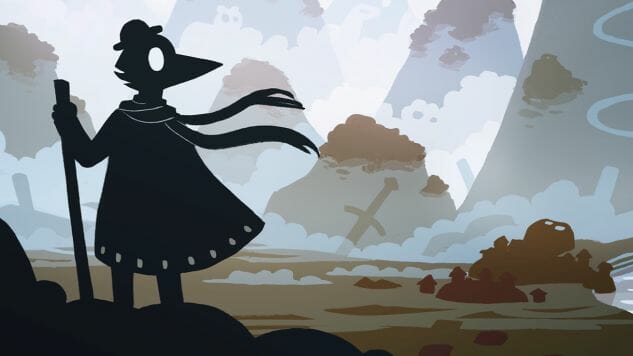
The beginning of a new year is the perfect time to take a deep look at yourself and realize there are some things that cannot be controlled by your own hands. There’s nothing like feeling that pang of mortality and helplessness. If you’re looking for a beautifully tragic game that captures that sensation, look to Storyseeker.
Storyseeker is both small in size but incredibly large in storytelling and design. In it, players control a traveler and cartographer, wandering across sea and land to map the wonders of the world and its inhabitants. Scattered around the world are pillars that can be activated to open a locked door to a secret area. The game provides no real objective other than to explore for as long as you want, before resting and creating a map of the areas you’ve found.
What I adore about the game is how unimportant you are. The world and its inhabitants have stories to tell. Something happened, and while you can learn a few things about the conflict, nothing tells a full story. Further, nothing changes while you wander. There are no actions to help anyone’s problems; you can only listen to the people and animals. At first, the lack of responsibility felt refreshing. There were no problems for me to solve, no people I needed to save, no mysteries that needed my eye to uncover. I greatly appreciated the ability to meander, until I found all the pillars and entered the locked room.
The room is the heart of time, and the heart of the world’s problem. It turns out time has stopped. A monster is holding onto a cog that has stopped time in the world. The monster says there’s nothing I can do.
Suddenly, my helplessness was a huge burden. Storyseeker punished me for looking for the story it merely hinted at. Instincts told me to look for a solution in the room. I looked for a hidden area I could walk through, a weapon I could use, even a way to talk to the monster. But the game was blunt and honest when it said there was nothing to do. There really was nothing to do, no matter how hard I looked. The truth created a sense of helplessness that felt both good and bad. I mourned the people in the world, unable to move or to understand their predicament. But I also loved the game’s ability to make me feel so inconsequential. I wasn’t the hero—I was as useless in this situation as anybody else. The world is not my problem to solve, despite my urge for it to be.
When I finally decided to end the game by resting, the little explorer quickly sets up a tent and draws a map of the areas I explored, and then it ends. The cartographer, objective in their mission, found new areas and stories to add to their map. Their job was done. But I was left feeling the weight of a world I could merely observe.
Shonté Daniels is a poet who occasionally writes about games. Her games writing has appeared in Kill Screen, Motherboard, Waypoint and elsewhere. Her poetry can be seen at Puerto del Sol, Baltimore Review, Phoebe, and others literary journals. Check out Shonte-Daniels.com a full archive, or follow her for sporadic tweeting.